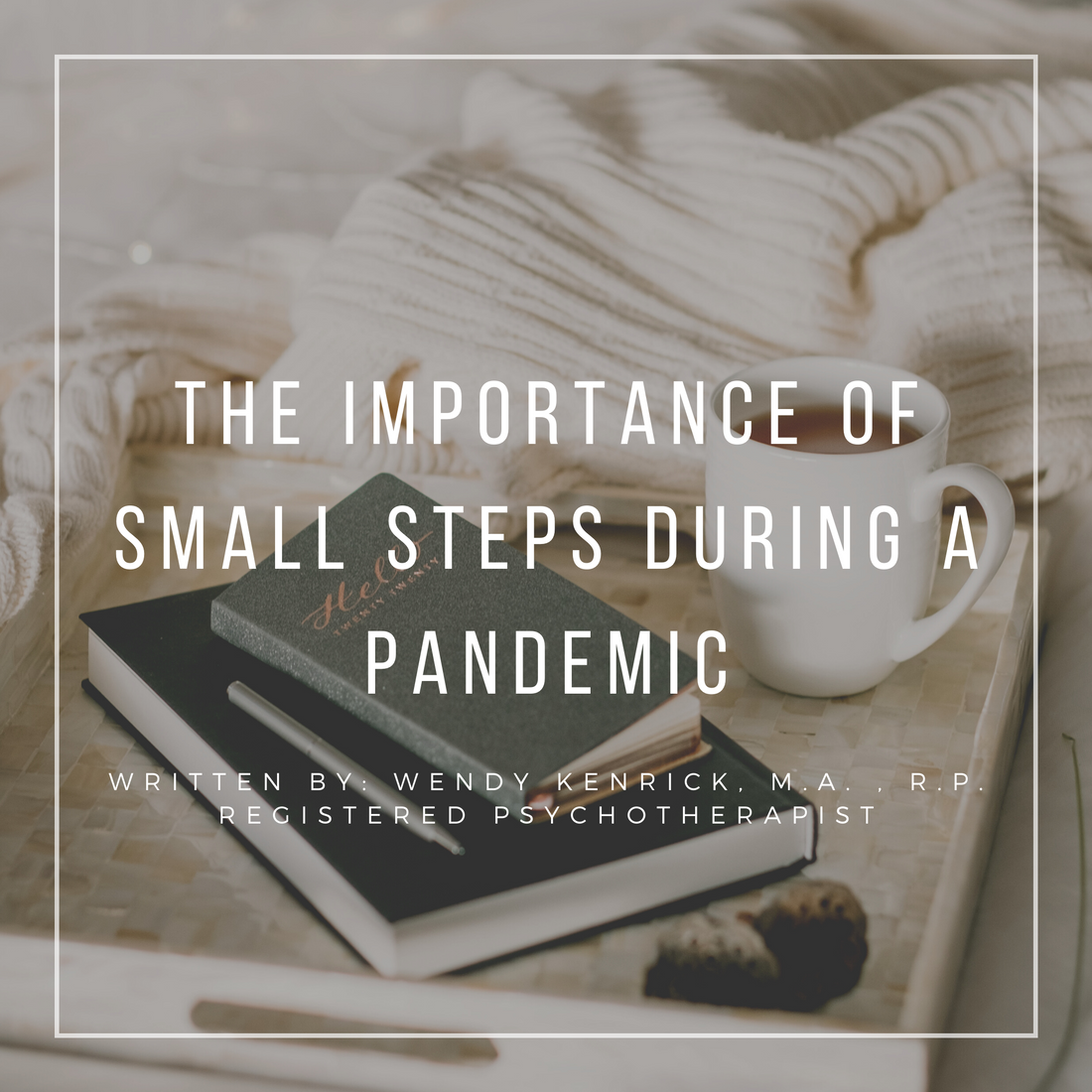Written by: Wendy Kenrick, M.A. , R.P. Registered Psychotherapist
When I sat down to write this article I struggled with getting started, because I know the responses to navigating the pandemic have varied. While some have reported feeling empowered, many others have reported a looming sense of dread. This article is intended to support you, no matter what you are feeling, even if some of those feelings seem to contradict one another. Given your experiences with the pandemic and your perspective on it, your feelings make sense. Your feelings may also change, and that makes sense too. We are approaching the 11th month of living in a pandemic.
With everything going on right now many of us may feel overwhelmed, exhausted, disconnected, frustrated, fed up and even scared at times. We have been exposed to so much information about how to navigate the challenges associated with the pandemic over the past 11 months, and that information is changing constantly, on a daily (and sometimes hourly) basis.
All of our lives have had to change in one way or another. From those who continue to work more than ever and are wishing for a break, to those who have been forced away from their work and can’t wait to return to earning an income. Everyone is facing challenges that they likely haven’t encountered before, at levels we haven’t had to face before, and many of us may be on the verge of burning out.
Burnout was initially defined using 3 components1:
- Emotional exhaustion – the fatigue that comes from caring too much, for too long;
- Depersonalization – the depletion of empathy, caring and compassion; and
- Decreased sense of accomplishment – a sense of futility, feeling that nothing you do will make a difference.
In other words, burnout is a consequence of excessive stress leading to chronic fatigue and lack of enthusiasm.2 Given the many things that 2020, and now 2021, has offered us in terms of ongoing and increasing stressors, it would make a lot of sense that so many of us are feeling burned out.
For example, what used to be a relatively ‘easy’ and ‘normal’ thing to do (e.g., grab groceries on the way home from work), is now much more complicated. Do you have your mask? Will there be a line up outside? What’s the wind-chill? Do you have warm enough clothing to wait? How much time do you have available right now? Will there be a lot of people in the checkout line? Will they have the food you came to get? What did you plan for meals this week? Is there anything missing on your list? Wait, where is the list? Do you have enough money to get what you need? Do you need to pick up anything for someone else that isn’t able to get to the store on their own? So. Many. Questions.
In addition to the increase in detailed planning and logistics for many things that were previously relatively routine events, most of the news we consume indicates there is danger and we need to be careful. Our internal and subconscious surveillance system is in overdrive, constantly working in the background to read subtle and not so subtle signals of safety or threat. Feeling exhausted? That makes sense.
With the acknowledgement that all of these things are going on, what can we do to help ourselves (and others) get through this?
What is the smallest step we can take? What things can we pick to focus on, noting and respecting the limited energy we have available?

Experts who study human behaviour around the world have some concrete recommendations3:
- Believe in human ability. We have overcome many things, individually and as a society, and we can get through this too, with help. If you have the bandwidth, is there is anything you would like to do to help? Even the smallest gesture of kindness to a stranger can make a significant difference to the person on the receiving end of your good will.
- Consider taking a long-term perspective. While it can be helpful at times to focus on the immediate future, the day, week, or even the next hour, sometimes it can also be helpful to shift your perspective. What are you looking forward to? What is important to you in the long run? What do you value? Is there anything you can do now that would be in support of those values? Maybe it means easing up on the expectations we have of ourselves and/or our kids, and instead offering compassion and flexibility.
- Find a way to take charge of your day-to-day life amidst all of this uncertainty. That 20-minute walk outside may not seem appealing, but it can make a difference in terms of a sense of accomplishment and knowing you are looking after yourself, even when (especially when) you don’t feel like it. Starting with 5-minutes a day is ok – small steps. Steadying yourself with some daily rituals may help when life feels like a roller coaster. What structure or routine can you offer yourself? Maybe part of that routine is finding a way to make a difference in someone else’s life which leads me to their next recommendation…
- Being connected socially, albeit currently in very creative ways, is a critical factor. Coming up with small traditions may be helpful with loved ones, friends, and neighbours. Some people have started cooking dinner for each other and dropping it off one night a week or sending a handwritten note to someone you’ve been thinking of. Others are offering to volunteer remotely for organizations that need help. If it might interest you, the city of Waterloo has offered a second round of financial support for neighbour-led community building initiatives that support connection during the pandemic (check it out here). The city has also launched a community happiness program, a kindness campaign if you will, to spread messages of hope through the winter season (you can check that initiative out here).
All of these recommendations can play a protective role in your mental health, and that of others.
There are also many support options available. If talking to a therapist has been something you have been curious about, if there was ever a time to try it, the time is now. Check out some of their profiles on Psychology Today. You can search by city and see the pictures and short write ups of each therapist. Who knows, you might find someone that you would be interested in working with. Therapists see people on all aspects of the mental health continuum, including those who want to optimize their mental health, so please don’t feel that you have to be in a really bad way before you reach out. We are here to help everyone.
You can also look into some of the local community supports that are available. I’ve included a few links below:
- The Canadian Mental Health Association of Waterloo Region has a number of resources available, many without any fees. One example is their self-help and peer support program and I’ve included a link to their January calendar here so you can get an idea of the types of things offered (the February calendar hadn’t been released at the time this article was written).
- Here24/7 is a resource to reach out to as the ‘front door’ for help with addictions, mental health, and crisis services that are provided by 11 agencies across Waterloo Wellington. As their name suggests, they answer calls 24 hours a day, 7 days a week. In my experiences, the staff has always very supportive and helpful.
If you’re not really up to speaking to someone (and you are not in crisis), you could check out an interesting (and free) app called Woe-Bot. I’ve tried it myself and found it quite entertaining, and yes, even helpful. Woe-Bot is clinically validated and designed by Stanford-trained researchers and psychologists. It uses engaging exercises to make learning enjoyable, teaching helpful concepts in use in day-to-day life, which helps to improve our quality of life.
If you are interested in some reading, I’ve also included a list of some of my favourite (and hopefully helpful) books below:
- Emotional Agility: Get unstuck, embrace change, and thrive in work and life by Dr. Susan David (Dr. David also has a podcast called ‘Checking In’ and each episode is less than 15 minutes, great for when our attention span and/or time is limited).
- Burnout: The Secret to Unlocking the Stress Cycle by Emily Nagoski and Amelia Nagoski (here is a link to an audio sample of the book).
Of course, eating healthy foods and moving our body can be very important for us, and can be that much more important when we are feeling tired and depleted. It is not uncommon for us to fall into a place of being critical of ourselves for not being able to “do better” and yet research shows that being critical of ourselves can make us even less inclined to change our behaviours. Instead, I encourage you to decide to offer yourself the gift of self-compassion and understanding. We are all trying to do the best we can right now, and that will change on a daily basis. Offering kindness and understanding is especially important right now, both to others as well as ourselves.
Please remember that connections with others can make a significant difference so please talk to someone you trust about what’s on your mind. Chances are you’re not alone in how you’re feeling and that sense of support and understanding, that connection, is as essential as food and water.
I hope this article and the resources within can provide you with support, and maybe even some ideas of what can help all of us get through the next few months.
Please note that this article is not intended to be a substitute for personalized professional advice, diagnosis, or treatment. Always seek the assistance of your mental health provider, or other qualified health provider with any questions you may have regarding your situation and/or condition. Please do not disregard professional advice or delay in seeking it because of something you read here, or anywhere else.
If you are ever in crisis, please dial 9-1-1 or head to the nearest emergency department.
Wendy Kenrick is a Registered Psychotherapist, based in Uptown Waterloo and currently practicing online due to the pandemic. Wendy’s private practice focuses on supporting professionals who are struggling with anxiety, depression, and burnout. She also has a special interest in working with blended families and stepparents as building a new and blended family is a very unique and complex process. For more information, please visit www.wendykenrick.com.
References
1 Freudenberger, H. J. (1975). The staff burn-out syndrome in alternative institutions. Psychotherapy: Theory, Research & Practice, 12(1), 73-82. https://doi.org/10.1037/h0086411
2 Ibid.
3 Grossman, I. (2021, January 17). Tips from experts on how to endure until the coronavirus pandemic ends. Kitchener Today. https://www.kitchenertoday.com/coronavirus-covid-19-local-news/tips-from-experts-on-how-to-endure-until-the-coronavirus-pandemic-ends-3264172

